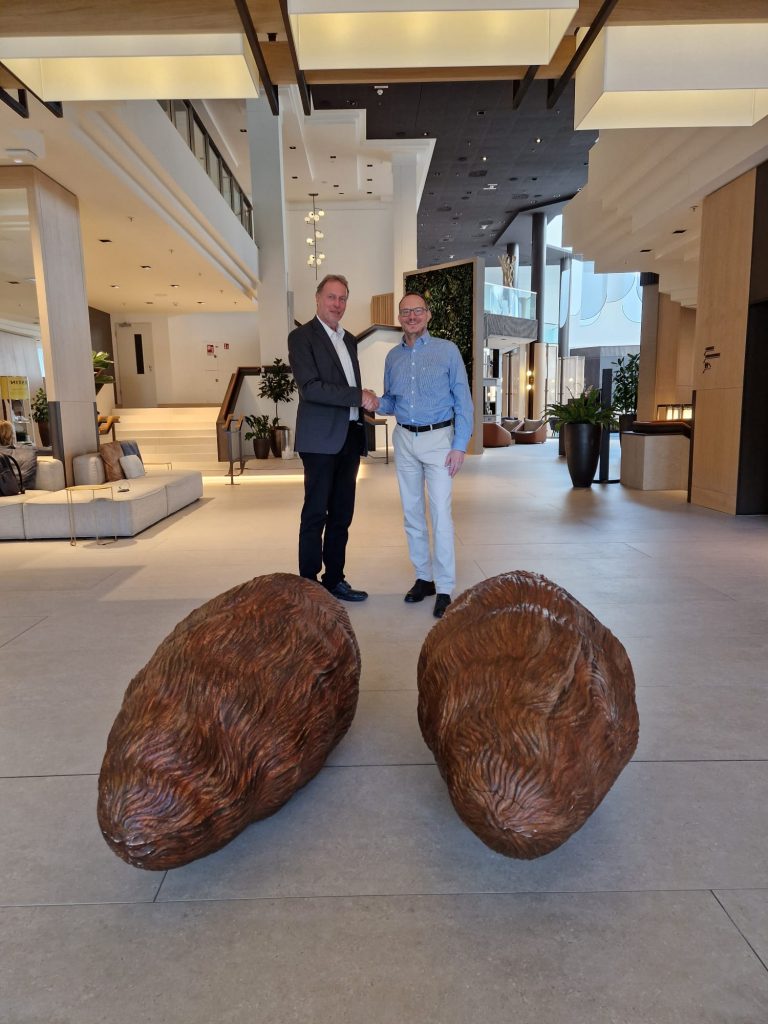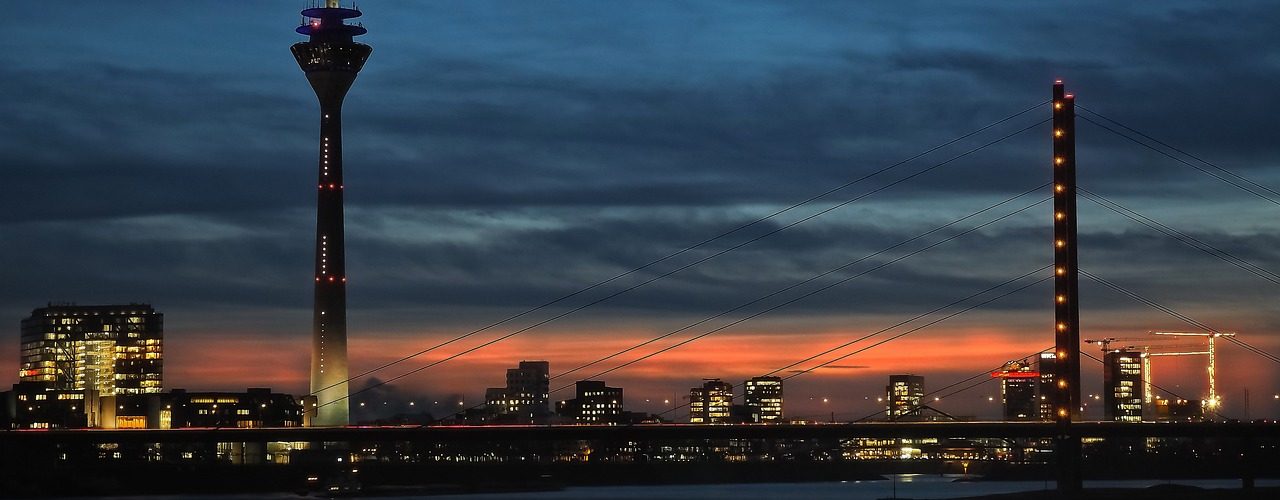“Financial Centre North Rhine-Westphalia”, Financial Centre Frankfurt, Economy, Innovation, Germany Finance & Cooperation of Financial Centres – Markus Hill spoke for FINANZPLATZ-FRANKFURT-MAIN.DE about these topics with Heinz Joachim Plessentin, former coordinator of Fin.Connect.NRW at the Ministry of Economics of NRW. Further components of the discussion were additionally the areas of venture capital, ESG, and transformation as well as the contents of the study “Germany as a financial centre as a cornerstone of the European financial system”.
Hill: Fin.Connect.NRW has attracted attention beyond the state borders. Compared to other financial centres such as Frankfurt, the financial centre initiative is still relatively young. What are the special features, what is the unique selling point of Fin.Connect.NRW?
Plessentin: Indeed, the structures in North Rhine-Westphalia are special. The state has a rather decentralized organization with several major centres such as Düsseldorf, Cologne, and Münster. North Rhine-Westphalia is Germany’s second-largest banking center after Frankfurt, with a focus on Düsseldorf. Next to Munich, Cologne is the strongest insurance location. The state is an important location for industry, medium-sized businesses, and science. Accordingly, Fin.Connect.NRW is not a city-based initiative, but an overarching state initiative that brings together all the players. Fin.Connect.NRW is the financial centre initiative focusing on sustainable, climate-neutral, and digital transformation and its financing. We also have the classic financial center topics on the agenda: location marketing, human resources, innovation & fintech. For example, InsurLab Germany in Cologne is the largest industry initiative to promote digitization and innovation in the insurance industry.

Heinz-Joachim Plessentin, Fin.Connect.NRW & Markus Hill
Hill: For a financial center initiative, the ecosystem and networking are crucial. Networking is essentially based on contacts in the financial industry and the business sectors, personal trust, and mutual appreciation. Who is on board as a cooperation partner in Fin.Connect.NRW?
Plessentin: Fin.Connect.NRW will further expand NRW’s financial ecosystem, especially given the major economic challenge of transformation. The competitiveness and performance of a financial center and sustainable finance in the broader sense depend to a large extent on the performance of the ecosystem. We “span the arc” from science to finance to the “real economy”. The real economy is represented by the NRW Chamber of Industry and Commerce, the credit industry associations, and the NRW headquarters of the Deutsche Bundesbank are also founding members. Furthermore, in addition to the insurance industry, the stock exchange, private equity companies, NRW.BANK, the Center for Innovation and Technology in North Rhine-Westphalia, or ZENIT for short, the Institute of German Business and the Institute of Energy Economics at the University of Cologne, bank and business professors, and consulting firms such as BCG and zeb are part of the initiative.
Hill: That’s impressive. Who is coordinating the initiative?
Plessentin: We see diversity as a strength. Fin.Connect.NRW is primarily about the topics. The structures are still developing. At present, coordination lies with the Ministry of Economic Affairs, SMEs, Climate Protection and Energy of the State of North Rhine-Westphalia, specifically with my colleague Dr. Dirk Schlotböller and myself in particular. In line with the Future Contract for North Rhine-Westphalia (coalition agreement), Fin.Connect.NRW is being strengthened. On June 14, 2023, the state parliament of North Rhine-Westphalia resolved to strengthen the Fin.Connect.NRW financial center initiative. Specifically, the state parliament has instructed the state government to strengthen the financial center initiative Fin.Connect.NRW and the networking between stakeholders such as companies, the credit industry, insurance companies as well as other players. On this platform, the players are to be able to offer tailor-made financing instruments for syndicated financing with several lenders and to mediate partners. A comprehensive information campaign is to be developed to raise awareness of Fin.Connect.NRW among the relevant target groups. The first NRW climate protection package adopted by the cabinet also includes strengthening Fin.Connect.NRW by awarding it an office, which will start work on November 1, 2023.
Hill: I would like to ask you to elaborate on the conceptual cornerstones. Is diversity a strength of the financial centre?
Plessentin: Yes, we are convinced of that. A study by Germany Finance and Zeb (study entitled “Germany as a financial center – a cornerstone of the European financial system”, in cooperation with the Chair of Banking and Financial Services at the University of Hohenheim, Prof. Burghof, on which I was involved) proves that diversity is an advantage and a strength of the financial system: The German financial centre is an excellent fit with the decentralized, medium-sized economic structure and German federalism. The structures of the economy and the banking sector are very similar. Our financial center consists of several leading regional financial centers with different focuses. This corresponds to the well-known structure of the German real economy, which is diverse, high-growth, international, and stable. New challenges have to be mastered. A diversified economy has a good chance of doing so. The sustainable transformation of the economy – the megatrend of the 21st century – and its financing require a departure and massive innovation, investment, and funding. To explain: Fin.Connect.NRW is a founding member of the Germany Finance working group, along with Frankfurt Main Finance, Finanzplatz Hamburg, Stuttgart Financial, and Finanzplatz München Initiative (with observer status); Berlin Finance Initiative was added. The participating organizations have thus initiated a joint platform to further promote continuous exchange among each other and to provide a central point of contact for people from Germany and abroad interested in Germany as a financial centre.
Hill: How does the cooperation at Germany Finance work? I ask this also against the background that I know and appreciate Frankfurt very well, come from NRW/Cologne, and know that cooperation between countries, financial centres, and organizations is often not that easy.
Plessentin: The cooperation at Germany Finance works well and collegially. This year, the spokesperson role is in Frankfurt, and 2024 it will be with Fin.Connect.NRW. As Germany Finance, we have achieved a lot together with studies on the financial centre, the fintech location, sustainable finance, and in the spring with the consultation on the attractiveness of the financial sector for young people. The cooperation also works well at Fin.Connect.NRW.
Hill: Experience, overarching expertise, and trust built up over the years are essential for coordinating a financial center initiative. My talks, as you know, are therefore about the cause and the people. You are an employee of the Ministry of Economics of North Rhine-Westphalia, were previously with DZ Bank, have dealt with corporate loans and equity financing, funding, and supervisory issues, and are also an author on these issues. What are your personal experiences and assessments?
Plessentin: In the Ministry of Economics of North Rhine-Westphalia, I am involved in the policy department, which deals with issues relating to the future. Coordination and development of Fin.Connect.NRW are therefore not my only task; I also deal with the fundamental issues of the capital and financial markets. My professional experience at renowned institutions (DZ Bank and KfW by today’s name) helps me in this. In addition, the experience I have gained from providing expert support in top-level meetings, in chairing working groups at the federal and state levels, with the departments in the preparation of development bank committees, and with the business community also helps. I have a degree in business administration and am considered a “veteran” of the financial center.
Hill: This has shed light on the framework conditions of Fin.Connect.NRW and your coordination, which are essential for understanding. The successes so far are impressive. Nevertheless, more resources and more flexibility are needed for this ambitious task in a scale-up phase. Now to the brand core. The focus of Fin.Connect.NRW is on transformation financing. What does that mean in concrete terms?
Plessentin: The Institute of the German Economy in Cologne has estimated the investment required for climate-neutral and digital transformation at 70 billion euros per year for NRW alone (IW report “Transformation in NRW. How can the digital and climate-neutral transformation of companies in NRW best be financed?”). Of this, climate-neutral transformation accounts for 50 billion euros. This includes both additional and replacement investments. From today’s perspective, the figure is more like 80 billion euros p.a. The majority will have to be financed privately. The banks cannot handle this alone; better use must also be made of the capital market. The challenge in transformation financing is often to better match capital supply and demand. The IW report outlines recommendations for action. The state government and Minister Neubaur have set the “Joint Project Climate-Neutral Industrial Region” as their goal. North Rhine-Westphalia is to become the first climate-neutral industrial region in Europe and a pioneer on the road to climate neutrality. Fin.Connect.NRW is intended to bundle the forces for the transformation. Fin.Connect.NRW can initiate new solutions. The contribution of the financial sector and companies on this path to the future is of great importance.
Hill: Indeed, the challenges are great right now. Sustainability, climate neutrality, and digitalization are crucial for the financial industry and companies. Business models must be transformed, products and processes adapted, and ESG criteria given greater consideration. How can Fin.Connect.NRW, with its limited resources, contribute to this.
Plessentin: In the start-up phase of Fin.Connect.NRW, the IW’s report was important. It was commissioned jointly with the banking industry associations and quantified the investment and financing requirements for the transformation in NRW for the first time. The financial sector and companies would be well advised to take advantage of the opportunities presented by the transformation. A survey shows that larger companies have opportunities for their competitiveness “on their radar.” For small and medium-sized enterprises, there is often a need for information. Fin.Connect.NRW, therefore, organizes solution-oriented events together with its cooperation partners to bring together different players across the board, raise awareness, provide practical information, and impart knowledge. The website and the quarterly newsletter also serve this purpose. We are pleased that these offerings are well received. In the future, it will be important to further intensify matching together with our partners to advance the financial center, the transformation of companies, and their financing.
Hill: You are often in Frankfurt. What do you appreciate about Frankfurt?
Plessentin: Frankfurt is the largest German banking center and is internationally positioned. The cooperation with colleagues is good and I get together to exchange ideas. And it’s only a stone’s throw from the Rhine to the Main.
Hill: Finally, a personal question: How long will you continue to coordinate Fin.Connect.NRW? Will you continue to contribute your diverse experience and expertise?
Plessentin: My term of service at the NRW Ministry of Economic Affairs ends on July 31, 2023, so I would like to take this opportunity to thank my colleagues and cooperation partners for their trust and constructive collaboration. I enjoy the topics, the network is pronounced and I have requests. Let’s have a look.
Hill: Great tasks, an interesting prospects and definitely inspiring. Thank you for the interview.
Over four decades, H.-.Joachim Plessentin has provided important impetus and contributions to the economic policy development of the state of North Rhine-Westphalia in various capacities, contributing his expertise in an advisory and supportive capacity. He coordinated the financial center initiative Fin.Connect.NRW from June 15, 2020 to July 31, 2023, was a long-time employee of the NRW Ministry of Economics and previously a banker at DZ Bank and KfW (current designations), holds a degree in business administration and is an author. The interview was conducted in July 2023.
Links: www.fin-connect-nrw.de
Germany Finance (germany-finance.com)
Der Finanzplatz Deutschland als Eckstein des europäischen Finanzsystems
Photo: Pixabay – Photo: Plessentin/Hill ( Finanzplatz Frankfurt)

One thought on “FINANCIAL CENTRE FRANKFURT & NETWORKING: New impulses through Fin.Connect.NRW, ecosystems, know-how, sustainable finance, Germany Finance & “A Stone’s Throw Away” (INTERVIEW – Heinz-Joachim Plessentin)”